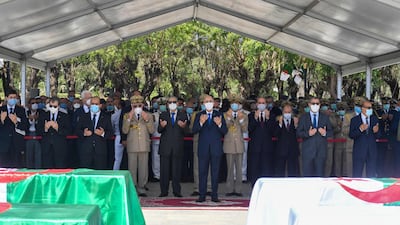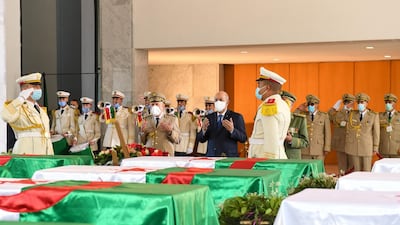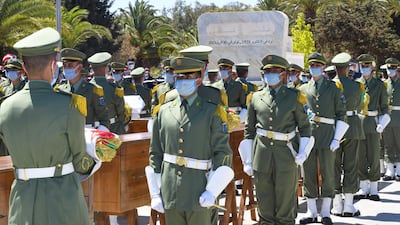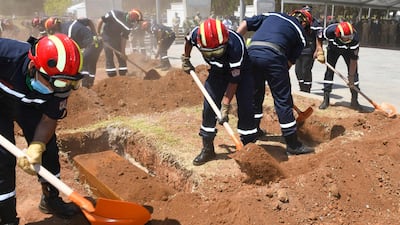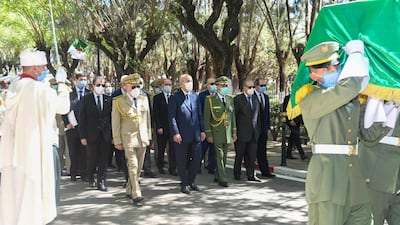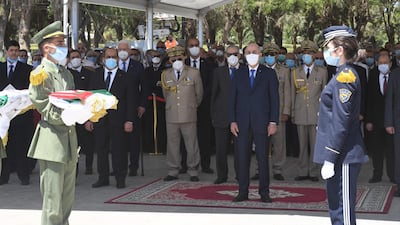On the 58th anniversary of Algeria gaining its independence from French colonialist rule, young Algerians shared stories passed to them from older relatives.
The outpouring of often harrowing tales was prompted by Khadidja Bouchellia, a 28-year-old Algerian living in Arkansas, US.
In a message posted on Twitter on Sunday, she asked fellow users: "Please share your stories, your parents and grandparents stories about French colonialism in Algeria. I will retweet them," adding the hashtag #FrenchColonialismInAlgeria.
Ms Bouchellia, who is studying for a PhD in Comparative Literature and Cultural Studies and whose work often centres on colonial and postcolonial struggles, said storytelling is an essential part of commemorations for Algerian independence day.
"On the eve of Algeria's independence day, some families gather to commemorate those who lost their lives to free the country," she told The National.
“Within my family, we used to gather around my grandmother, who passed away three years ago, and talk about Algeria's colonial history.
Since Ms Bouchellia’s grandmother died, her parents have taken over the storytelling role, and it was a conversation with them that prompted her online call to share experiences.
“Storytelling is an act of resistance. For Algerians, remembrance is part of that anti-colonial resistance. They have always resisted through storytelling. It's not new, but a platform like Twitter has helped uplift voices,” she said.
French rule, and the eight-year war for independence, took a brutal toll on Algerians, leaving over 1.5 million dead and many more injured and traumatised before the French withdrew in 1962 after 132 years.
In December 2018, Emmanuel Macron admitted the French had designed a “system” of arrest, which allowed “acts that were sometimes terrible, including torture”.
Mr Macron, the first French president to be born after the war, made his first official visit to Algiers in December 2017 and during his election campaign called his country’s colonisation of Algeria a "crime against humanity".
Algerian president Abdelmadjid Tebboune has called on France to apologise for its colonial past.
Users responded to Ms Bouchellia’s call for stories in droves, detailing traumatic, brutal encounters with French forces.
“My grandfather was taken prisoner and tortured. They beat him, cut off his ear etc. But alhamdulillah he escaped and survived,” wrote Natalia, 17.
She decided to share her family’s past after reading all the other comments, and hopes the swell in messages will help to educate others on the Algerian struggle.
“I try to retweet everything about Algeria so my followers can learn what the French did to Algeria,” she said.
Natalia feels Algerian freedom fighters were made into a “mockery” by the French, who only returned the skulls of 24 resistance fighters this week.
The skulls of the men, shot and decapitated in the early years of the French occupation, were laid to rest during an emotional ceremony at El Alia cemetery on Sunday.
The skulls had been stored since the 19th century in the vaults of the Musee de l'Homme in Paris, which specialises in anthropology.
Other replies included tales of women smuggling weaponry, stories of torture and destruction of property.
Some were more humorous. "One of my dad's uncles, who was small in height, was wanted and managed to enter a French base at night, brought the French flag down and replaced it with an Algerian flag," one user wrote.
The number of replies may have surprised some, but the content didn’t, said Ms Bouchellia.
“Stories of torture and bloodshed are engraved in our national memory. Algerians were subjugated to ethnic cleansing, driven out of their homes, imprisoned, hung, electrocuted, buried alive, shot, bombarded, raped, and decapitated,” she said.
“It doesn't end there of course; our history is filled with massacres and genocide. French colonialism was brutal, and we are still seeing the effect of it today.”


